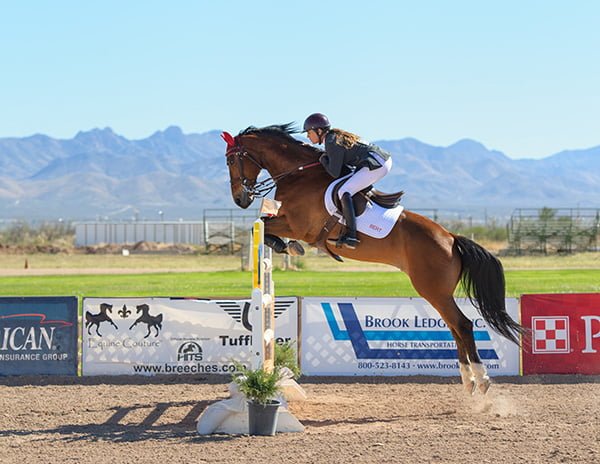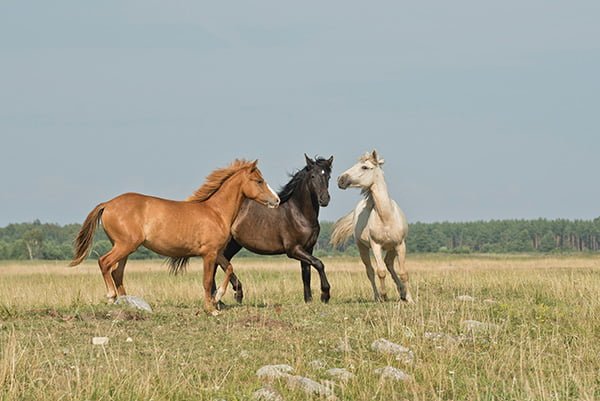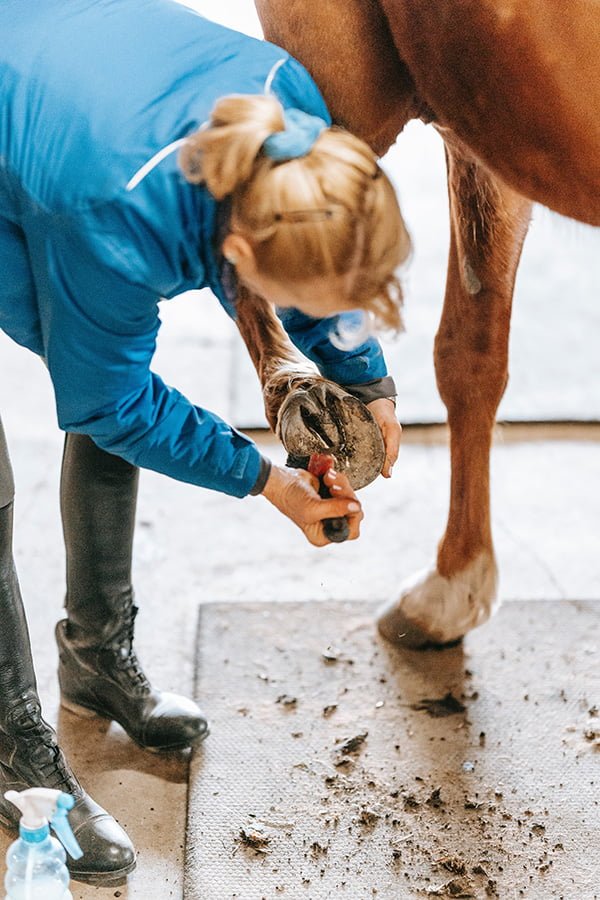Horseshoes are man made, u-shaped plates fastened to the bottom or ground side (also called the palmer) of a horse's hoof and secured with nails or glue. These plates are most commonly made of steel or aluminum but can also be made of plastic, rubber, and copper. Horseshoes are made and applied by farriers, a person who shoes horses and ensures that the fit is right for your horse.
Temporary shoes are often fastened with glue, while shoes worn more regularly are fastened with nails that are painlessly secured by the horse's hoof. A horse with shoes is called a shod horse, and one without shoes is called unshod or barefoot.
Why Do Horses Need Shoes?
Horseshoes have been used for centuries to allow horses to participate in work or activities requiring additional hoof and foot support. Horseshoes' primary purpose is to provide protection to a horse's foot and to slow the wearing-down process of the hoof. Horses wear shoes for horse hooves' safety, protection, and longevity.
Slowing Wear-Down
In the wild, a horse's hooves are naturally worn down with regular use on neutral and natural terrain. Domesticated horses, however, often work and walk on much harder or rougher surfaces and with additional weight and stress. This wears down the hooves faster than normal and can lead to hoof deformities and diseases.
Surfaces
Another reason horses are shod is to give them a layer of protection against less-than-ideal surface conditions. Shoes keep hooves, feet, soles, and the hoof wall from disease and issues they can get from walking on wet, damp, muddy surfaces and hard, rocky, or icy surfaces.
High Impact Activities
Horseshoes can provide extra protection for horses in high-impact sports or work. Competing horses may not always have soft or padded ground to work on, and shoes can protect your horse's legs from hard lands and jumps.

Source: Unsplash
Traction
For horses working on less ideal surfaces, shoes can help gain and maintain traction. This is especially true for horses that work or compete in snow, ice, or wet surfaces. Horse owners can get specialized shoes that can be made to aid a horse in being able to work in inclement conditions safely.
For Correction, Balance, and Health
Lastly, horses wear horseshoes for temporary or permanent correction or medical reasons. There are many reasons horse hooves may need correction, and some medical conditions can lead to issues requiring shoes to relieve pain. So shoes can improve balance, provide corrections, and relieve pain due to medical issues.
Pros and Cons of Horse Shoes
So are there cons to having your horse shod? The pros may seem to outweigh any possible cons but let's look at the pros and cons of both choices so you can decide if shoeing your horse is the best course of action.
Pros
Added protection on hard surfaces
Support for high-impact activities
Protection from damp or wet conditions
Capability to correct hooves, feet, stance, legs, or balance
The slower rate of wear means a little less maintenance
Better performance overall

Source: Unsplash
Cons
It can lead to serious injury if not correctly shod
More expensive
Pros and Cons of Barefoot Horses
Are there pros to not shoeing your horse? Is a barefoot horse a healthier horse? Let's look at these pros and cons too.
Pros
More natural performance
Some horses have better performance without, particularly in arena work
Cost-effective
Cons
More maintenance in trimming
Increased risk of injury in high-impact sports or on hard surfaces
How to Decide Whether or not to Shoe Your Horse
There is a lot of debate about whether or not a horse should go barefoot or be shod. In the end, it comes down to the owner's preferences and the needs of an individual horse.
Some things to consider as you decide whether or not to shoe your horse are what type of work your horse will be doing, what the condition of the ground and environment is, the overall health of your horse, the state of your horse's feet, hooves, and soles, and your own personal beliefs and preference on the matter.
Many people believe almost all horses should always be shod for all-around protection. Others believe that leisure horses or riding horses don't need to be shod and work or sport horses should be. Still, others prefer an all-natural approach, wherein a horse can be kept as close to its native condition as possible, like wild horses.
What you decide is up to you based on your preferences and your horse's needs. Some horses may need them, and some may not. There is no right or wrong answer definitively.

Source: Pexels
How Often Does a Horse Need to be Shoed?
If your horse does get shoes, how often will they need to be replaced or reset? Hooves are like a human's fingernails or toenails and continually grow. While there is some natural wearing over time, domesticated horses wearing shoes will still need to have their hooves shaped and trimmed to maintain healthy performance.
Shoeing done correctly will never hurt your horse, but the frequency with which you will need to take your horse in will vary quite a bit depending on your horse's activities.
A horse's shoes should be checked every six weeks as a general rule, though it may have to be more often for some individuals. For a general reset, a farrier will remove the shoes, trim and shape the hoof, and replace the shoe. If the shoe has worn too thin, they will replace the old shoe and make a new one.
FAQs
Do racehorses wear shoes?
Most racehorses wear shoes, with aluminum plates being the most popular choice. However, this also depends on the type of racetrack turf and race restriction.
What are alternatives to horseshoes?
Depending on the horse's working and living environment, some horses don't need shoes. When an unsuitable condition arises, some rider uses hoof boots, hoop wraps, rubber shoes, or glue on or tape on shoes.
